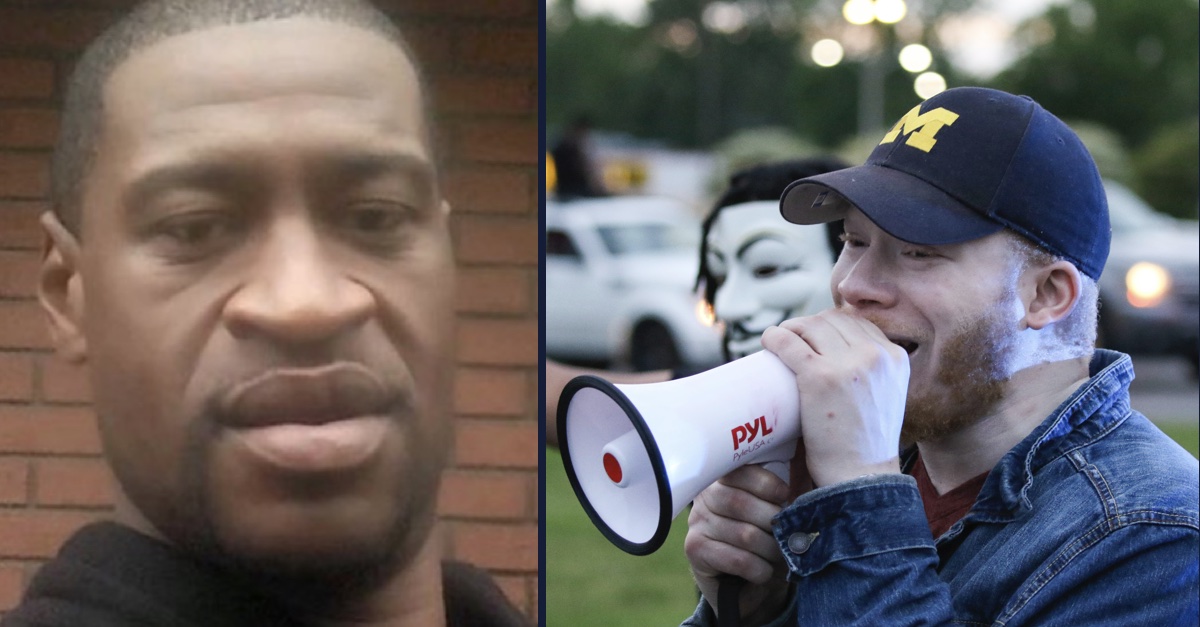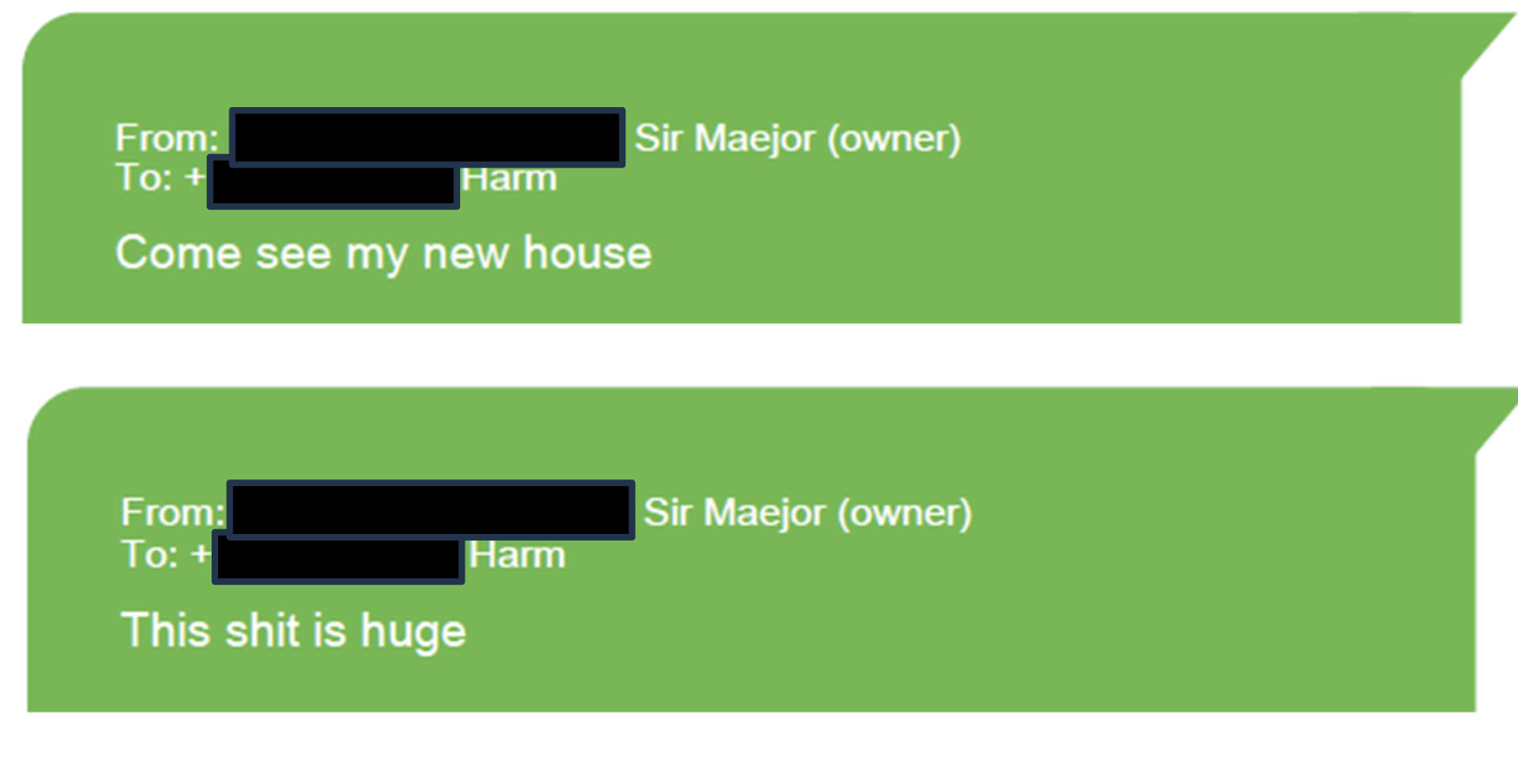
Left: George Floyd (Ben Crump). Right: Sir Maejor Page speaks to demonstrators during a march along Reynolds Road the month after George Floyd's death in 2020 (Scott W. Grau/Icon Sportswire/AP Images).
A repeat police impersonator and Black Lives Matter activist who ran a "fake charity scheme" and personally profited off of the murder of George Floyd to buy himself a house in Ohio is going to federal prison for three and a half years several months after a jury found him guilty of wire fraud and money laundering.
The defendant, 35-year-old Sir Maejor Page, also known as Tyree Conyers-Page, was indicted in March 2021 and accused of using the killings of George Floyd, Breonna Taylor, and Ahmaud Arbery to raise hundreds of thousands of dollars through his group Black Lives Matter of Greater Atlanta (BLMGA) based on the lie that "All funds will be used to fight for george floyd," for the "movement," and to "fight for justice."
Prosecutors said that BLMGA's "tax-exempt status as a charity" had been revoked by the IRS in May 2019, but that a Facebook page for the group still listed it as a nonprofit as Page received in excess of $450,000 from people interested in effecting change in the world.
But rather than spending "all" funds for movement-related activity, prosecutors said, Page spent lavishly on himself, whether on tailored suits, furniture store and Walmart shopping sprees, outings at nightclubs and bars, "a prostitute," guns, or even the purchase of a home in Ohio.
Prosecutors said, and jurors were persuaded, that Page took steps to "conceal" the property purchase by trying to conceal that he was the buyer through a proposed nondisclosure agreement.
The government's sentencing memo said that Page was motivated by "self-aggrandizement and self-satisfaction" and "lied to, and otherwise misled, members of his social justice organizations, and threatened anyone who questioned his methods with physical and/or reputational harm."
Then, at trial, the defendant "stubbornly denied and obfuscated his conduct" and "intentionally sought to mislead the jury" by asserting he bought house on the advice of a lawyer, prosecutors said.
While Page boasted in a text message that he "won the lottery" and "bought a big ass cribo," he attempted to make the case that he wasn't culpable.
"Defendant had a problem. So, having heard the Government's case-in-chief, Defendant elected to testify in a desperate bid to preserve his good faith defense by falsely portraying the house purchase as initiated on the advice of legal counsel. Defendant testified without corroboration that he had 'multiple conversations in July' with Attorney Hasson, 'weeks before' the closing," the government said. "This was a blatant lie that flew in contrast to every contemporaneous record."



The government said that the crimes led "thousands of donors" to lose money.
For his part, Page said that he was "born with fetal alcohol syndrome" and "albinism," and that he experienced a "difficult" upbringing, being "bullied at school and elsewhere as [he] was often the victim of racism." That, the defense memo said, is what inspired his Black Lives Matter activism.
Though the defense acknowledged wire fraud is a serious offense, Page's attorneys said he was no Sam Bankman-Fried or Elizabeth Holmes.
"Mr. Page on the other hand is not highly educated and coincidentally fell backwards into the donations," the defense said. "They came in based on the cataclysmic event of George Floyd's murder and had nothing to do with Mr. Page's deliberate effort."
Page argued that he didn't actually solicit the donations and that the money "came in completely unexpected based on the death of George Floyd and the donations ended just as quickly once the social unrest at that time ended."
"The scheme came about without a planned intent and the results were just as unintentional," the memo said.
U.S. Attorney for the Northern District of Ohio Rebecca C. Lutzko said, however, the truth remains that Page "took advantage of a cause meant to fight social injustices, using it instead to line his own pockets with thousands of dollars of donations" after telling inquiring donors the funds would be used for the "movement."
"People donate their hard-earned money to support causes they believe in, and when a fraudster like Page comes along and tries to get away with a fake charity scheme, it hurts legitimate nonprofit organizations that rely on the generosity of others to advance their missions and make positive change in the world," Lutzko added. "This Office will hold accountable those who try to profit by scamming unsuspecting people out of their money like Page did here."
Comments